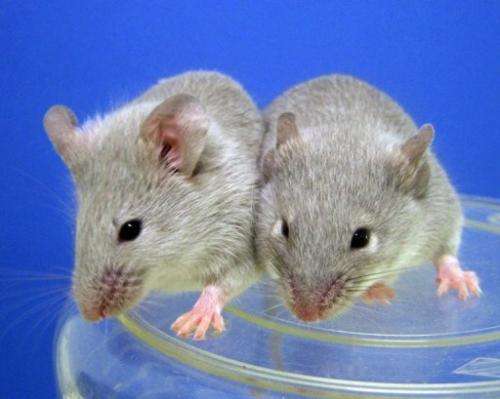This file photo, released from Kyoto University on October 5, 2012, shows two mice which were born from egg cells, made from indiced pluripotent stem (iPS) cells of a mouse. Japanese experts were on Tuesday set to discuss rules for experiments with animal-human embryos, as scientists seek permission for tests that could see human organs produced inside the growing body of an animal.
Proposed experiments with animal-human embryos cleared the first regulatory hurdle Tuesday, reports said, as Japanese scientists seek permission for tests that could see human organs produced inside the growing body of an animal.
Researchers want to introduce a human stem cell into an animal embryo, to create a so-called "chimeric embryo", which they can implant into an animal's womb.
The hope is that this stem cell will grow into a fully-functioning human organ—a kidney or a liver, for example—as the animal matures.
This would mean when the creature is fully grown, the organ could be harvested from the animal and used for transplanting into a person in need.
"Experts will study what possibilities this kind of research will generate," especially with regard to ethics and human dignity, a government official told AFP of the panel comprising scientists, law professors and journalists.
During the meeting the government-appointed panel agreed on the framework of its recommendation and is expected to announce its final conclusion as early as next month, public broadcaster NHK said.
That recommendation will be sent to a government committee tasked with drafting guidelines shaping the boundaries of Japan's cutting-edge embryonic research.
Unlike in the United States, there is little public opposition to research of this kind, with domestic media coverage overwhelmingly positive, reflecting relatively high levels of scientific literacy in the country.
Japan currently allows scientists to grow chimeric embryos for up to two weeks in test-tubes, but prohibits them from putting those embryos into an animal's womb, the official said.
In the proposed experiment, researchers, led by Hiromitsu Nakauchi of Tokyo University, want to implant a chimeric embryo made from a fertilised pig egg and a human "induced Pluripotent Stem cell" (iPS) into a pig's womb, he said.
Stem cells are infant cells that can develop into any part of the body.
Until the discovery of iPS cells several years ago, the only way to obtain stem cells was to harvest them from human embryos.
This is controversial because it requires the destruction of the embryo, a process to which religious conservatives, among others, object.
Pioneering work done in 2006 by Shinya Yamanaka at Kyoto University, a Nobel Laureate in medicine last year, succeeded in generating stem cells from skin tissue.
Like embryonic stem cells, iPS cells are also capable of developing into any cell in the body, but crucially their source material is readily available.
"We'll see if the experiment goes well, but if we succeed in producing a human organ, the rest of the work toward practical use would be done within five years," Nakauchi told AFP.
Nakauchi's team earlier this year succeeded in getting a white pig, which had been genetically altered so that it did not develop its own pancreas, to produce the pancreas of a black pig. The gland was genetically different to its host.
"Pigs have organs that are similar to human's, in terms of both size and shape. In addition, we eat them on a daily basis," he said.
"We have long used pigs in medicine, too. So they are thought to be acceptable to human bodies," he said, noting that pig insulin has been used to treat diabetics and that pigs' cardiac valves and pancreas have been transplanted successfully into humans.
© 2013 AFP






















